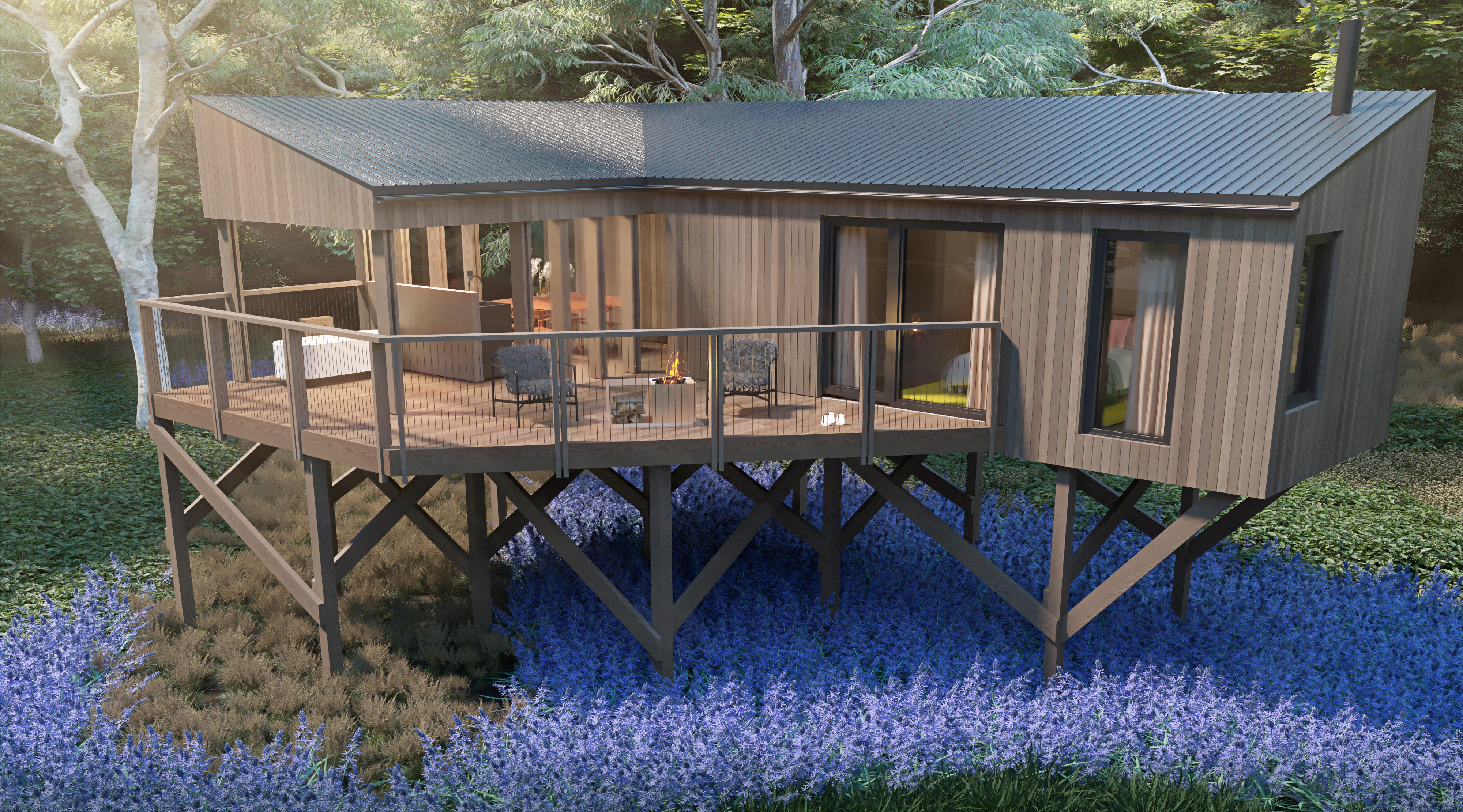Home swaps, rewilding treehouses and sustainable searches: How holiday accommodation is getting greener
There’s more to eco-accommodation than hotels ditching the mini toiletries. Helen Coffey looks at some of the latest positive developments when it comes to sustainable stays


Travel Positive is a new column where we celebrate the exciting sustainability wins in the travel industry that are giving us hope for the future.
How you get on holiday is something I spend an inordinate – possibly too much – time banging on about, passionate as I am about championing the flight-free transport options that are far less carbon-intensive than taking to the skies. But what about once you’ve reached your destination? Are hotels actually becoming more sustainable, or is it just so much greenwash when they boast of axing those plastic mini toiletries bottles or encouraging you to skip getting your towels laundered (a move that, a cynic might argue, is more motivated by saving them money than by a new-found love of the environment)?
One holiday accommodation option that’s caught my attention recently is home swapping. “What, that thing from The Holiday where Cameron Diaz and Jude Law have a one-night stand that leads to something more meaningful over Christmas in Kate Winslet’s Cotswold cottage?”, you may well be thinking. Why, yes! That’s exactly what we’re talking about. The concept has been around for decades, but it’s becoming ever-more popular, particularly as the cost of living crisis bites. As well as being a more affordable way of going away – allowing participants, if they do a straight swap, to stay in someone else’s place for free, or accrue points that they can then “spend” on the site when they allow people to stay in their own home – it can also be a more sustainable way to travel.
It’s undeniable that people across the world, no matter their location, are becoming more and more environmentally conscious
HomeExchange, which earned its B Corp Certification last year, argues that the whole model “optimises use of homes, rather than building new ones and pushing/pricing residents out of their cities”. It’s a compelling counter-offer to some online accommodation platforms that have been accused of inflating rental rates in popular cities, exacerbating overtourism issues and effectively pricing out locals who can’t afford to pay in rent what a tourist is prepared to spend on just a few nights away.
HomeExchange also calculates its carbon footprint each year with the aim of continually reducing it; compensates the emissions that remain through PUR Projet, a Verified Carbon Standard (VCS) and B Corp company; and employs a strict waste management policy at its offices. Travellers are incentivised further to be greener through, for example, an initiative offering GuestPoints to members who can prove they opted for train rather than plane when travelling to their home swap stay.
“It’s undeniable that people across the world, no matter their location, are becoming more and more environmentally conscious,” says HomeExchange CEO Emmanuel Arnaud. “However, at the same time, that consciousness hasn’t translated to travel as quickly as we would want – or need it to.”

Elsewhere, you could go green with your stay more literally, by plumping for accommodation that is part of a rewilding initiative. Freshly on my radar is Elmore Court, a venue in Gloucestershire that’s just announced details of ambitious rewilding plans, including the opening of six treehouses in May 2023. These quirky, self-contained and sustainably built properties will be tucked unobtrusively into the estate’s woodland, not far from the river Severn.
Anselm Guise, who inherited the estate in 2007, committed to setting aside 250 of the 1,000 acres of land for rewilding in 2020.
“We are reimagining the estate, taking it back to a closer relationship to the best bit of the ways things were, where the land and the people on it served each other to the benefit of all,” he says. “By combining rewilding and regenerative farming we will increase biodiversity, improve the soil, produce food and allow the land to breathe colour and positivity back into our environment.”
We are reimagining the estate, taking it back to a closer relationship to the best bit of the ways things were
The new treehouses are one part of that vision, and have been built “as sustainably as possible”, according to Anselm. Each self-catering cabin has electric car charging points, British cedar cladding with corrugated roofs, cork flooring and poplar ply walls. Their design maximises air tightness to prevent the escape of heat, as well as solar gain – using the sun to help naturally warm them – plus is highly insulated to lower energy use.
To ensure guests feel fully immersed in nature, each property has an outdoor bathtub, outdoor state-of-the-art kitchen, a modern brazier with wood store and seated decking. Inside, you’ll find super king-size beds and a fully kitted bathroom with shower. Prices start from around £290 per night, with a two-night minimum stay.
And finally on my accommodation radar this month – RightRooms.co, a hotel site that allows travellers to search for places to stay in granular detail to find a property that meets their needs. Every hotel listing with RightRooms is stringently audited on 800 data points around four key areas: accessibility, sustainability, wellness and family-friendliness. The idea is to allow travellers to filter and find their ideal hotel based on very specific needs or wants, in far greater detail than can be found on alternative hotel booking sites.
For example, eco-minded guests can narrow their search to find hotels that offer vegan toiletries, or where energy consumption is minimised through occupancy detection systems. One of the more-than-100 hotels currently listed on the site, The Beaumont in Mayfair, lists sustainability as a top priority.
“As a business, we recognise we have a responsibility to care for the environment well beyond the regulatory standards,” says Duncan Palmer, managing director of The Beaumont Hotel. “RightRooms’ audit picks up all the details we hope guests will appreciate and acts as a useful barometer of our efforts to be the most sustainable property we can be.”
The hotel’s listing highlights that all food waste is composted and that The Beaumont sends zero waste to landfill, plus notes that the hotel has a beehive on its roof and recycles unused complimentary toiletries.
So there you have it; keeping your carbon footprint low when planning a trip can feel like an uphill struggle, but there are increasingly accommodation platforms, hotels and search tools that can help us on our journey towards travelling more sustainably. And that feeling, more than a pair of blackout curtains, should ensure a good night’s sleep.
Join our commenting forum
Join thought-provoking conversations, follow other Independent readers and see their replies
Comments


Bookmark popover
Removed from bookmarks